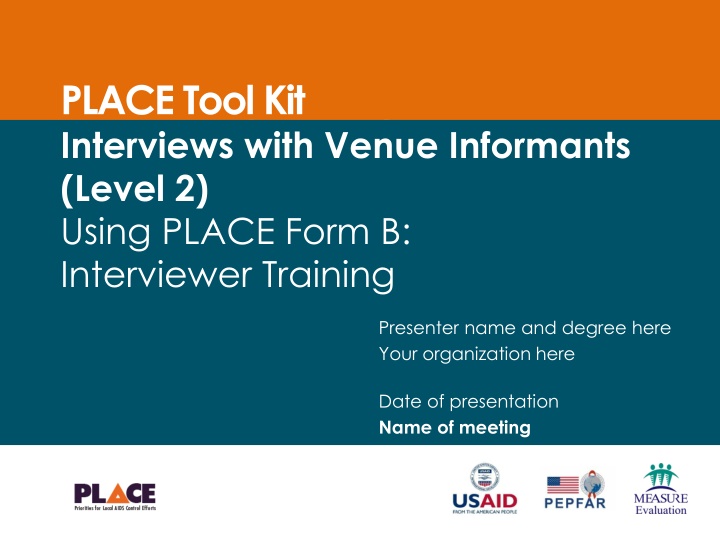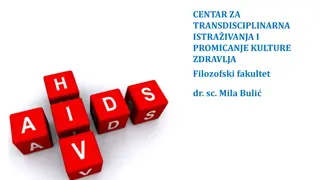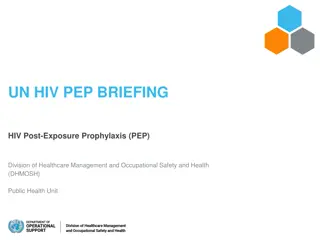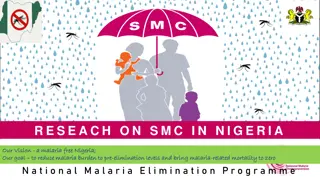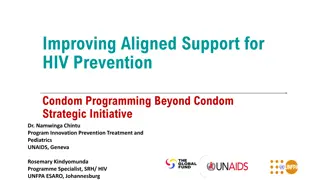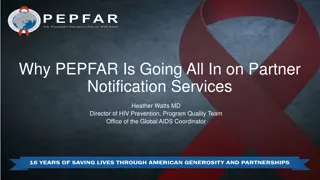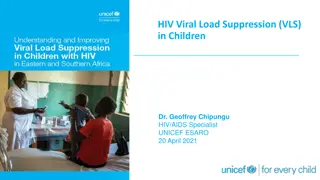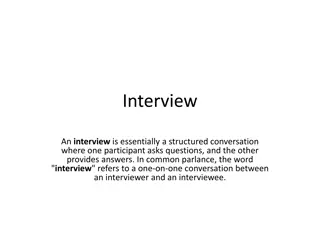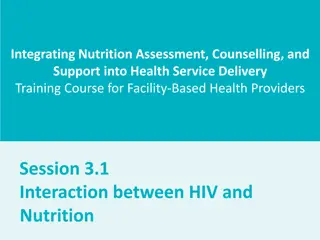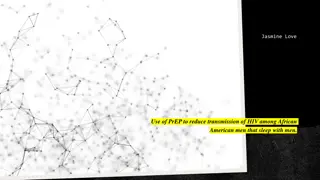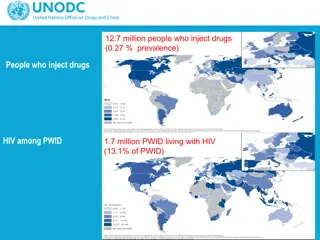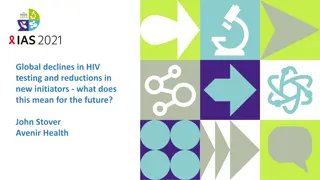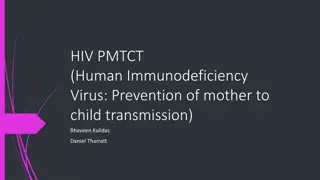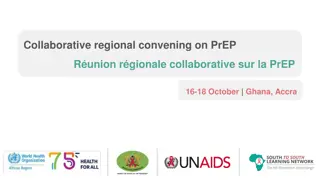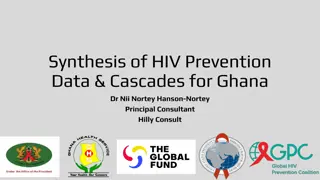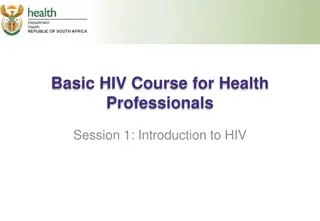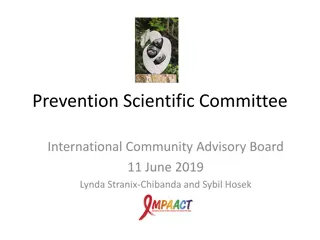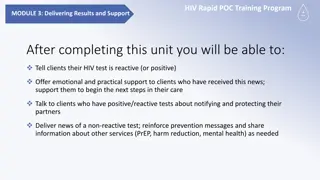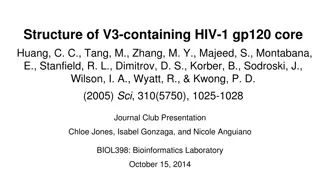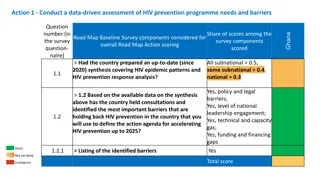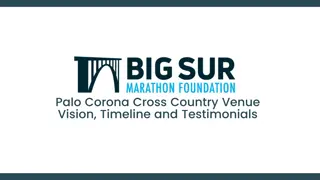Venue Informant Interviews: Gathering Essential Information for HIV Prevention Programs
Conducting venue informant interviews plays a crucial role in collecting data on venue characteristics and visitors for effective HIV prevention programs. Learn about the purpose, methods, and roles of venue informants in this comprehensive guide.
Download Presentation

Please find below an Image/Link to download the presentation.
The content on the website is provided AS IS for your information and personal use only. It may not be sold, licensed, or shared on other websites without obtaining consent from the author.If you encounter any issues during the download, it is possible that the publisher has removed the file from their server.
You are allowed to download the files provided on this website for personal or commercial use, subject to the condition that they are used lawfully. All files are the property of their respective owners.
The content on the website is provided AS IS for your information and personal use only. It may not be sold, licensed, or shared on other websites without obtaining consent from the author.
E N D
Presentation Transcript
PLACE Interviews with Venue Informants (Level 2) Using PLACE Form B: Interviews with Venue Informants (Level 2) Using PLACE Form B: Interviewer Training PLACE Tool Kit Interviewer Training Presenter name and degree here Your organization here Date of presentation Name of meeting
PLACE fieldwork Level 1: Community informant interviews Level 2: Venue informant interviews and mapping Level 3: Patron and worker interviews and HIV testing
Purpose of venue informant interviews Does the venue exist? Collect information about: Venue characteristics People who visit HIV prevention programs on site
Purpose of mapping venues Create maps useful to programs
How do we get this information? Visit the venue Interview a venue informant Use technology to measure latitude and longitude coordinates of venue
Working in pairs Venues are always visited in pairs One person interviews venue informant Security always stay together
Who are venue informants? People who spend a lot of time at the venue and know about what occurs there, the clients, and any HIV prevention programs that have been held there
Who is a good venue informant? (1) Drinking/sleeping venues Owner Worker Regular client Security guard Public spaces Street seller/vendor Business owner in sight of venue Regular visitor
Who is a good venue informant? (2) .at a street corner where there is sex work? .at a hotel? .at a truck stop? .beach? .at a bar where the venue staff do not agree to be interviewed?
Questionnaires Form B: Venue Informant Interview Provides space to record geographic coordinates, observations about venue, and observations about area around venue
Steps 16 1. Review list of assigned venues 2. Enter information provided by community informants 3. Record basic information about the venue (in operation, correct address) 4. Find venue informant 5. Introduce yourself and describe interview 6. Offer the Form B fact sheet for informed consent (continued)
Steps 7 11 7. Confirm eligibility (age 18 or older; willing) 8. Complete the interview using Form B 9. Thank informant and record outcome of visit on list of assigned venues 10. Complete observation modules 11. Measure mapping coordinates
Fact Sheet Informed Consent Fact Sheet
Activity: Read fact sheet Read the changed sections of the fact sheet aloud Interviewers take turns reading the sections What will the survey cover? and Can I refuse? Feel free to ask questions about the content of the fact sheet
Form B: Venue Informant Interview
Form B content Status of venue and confirm venue location and name Recruitment Staff at venue Venue visitors (patrons) Busy days and times Other venues nearby HIV prevention programs on site Interviewer observations of venue Mapping
Activity: Read questions Read Form B aloud Interviewers take turns reading a question and answer categories The questions will be explained later in depth
Form B content Status of venue and confirm venue location and name Recruitment (will review later) Staff at venue Venue visitors 1 Busy days and times Other venues nearby 2 HIV prevention programs on site Interviewer observations of venue Mapping (will provide instructions later) 3
Activity: Read questions in Section 1 Read Section 1 of Form B aloud again Interviewers take turns reading a question and its answer categories After each question is read, the trainer describes the type of information sought and answers any questions
Section 1: Confirm venue exists Status of venue: Does venue exist?
Section 1: Venue status options (1) Venue not found Venue found and operational Closed for a week or more, but not permanently Closed permanently Duplicate venue Other
Section 1: Venue status options (2) Venue not found Does not exist or not enough information to find it Venue found and operational Most venues! Closed for a week or more, but not permanently Example: for renovations, for the rainy season. If closed for one day, come back another day. Closed permanently No longer in operation Duplicate venue Example: You find out an interview was already conducted at the venue under a different name. No need to do another interview. Other
Section 1: Correct basic information Correct name, address, and type given by community informants, if necessary
Section 1: Venue visitors Questions about different people who visit a venue Including key populations
Who are men who have sex with men? Men who have sex with men may self-identify as being gay, homosexual, or bisexual. For PLACE, we will consider someone a man who has sex with men if he says that he has had anal sex with a man in the past year. Having anal sex is much riskier in terms of HIV risk than penis-to-vagina sex. Men who have sex with men are more likely to acquire HIV than other men. They are also less likely to get services.
Who are transgender people? Transgender people identify with a different gender than the one they were assigned at birth. For example, a transgender female was born male but over time felt more like a female than a male. In some cases, transgender people get hormone injections to change their appearance. Trans means changed. A transgender male was born female and became male. Transgender women are especially at risk for acquiring HIV.
Who are people who inject drugs? Many people get medical injections or vaccinations. These people are not at increased risk of HIV. PLACE is interested in finding places where programs can reach people who inject drugs, such as heroin, illegally. People who USE drugs such as marijuana or alcohol can have risky behaviors while under the influence of the drugs but there is an added risk from needles that makes finding injecting drug users very important.
Who are women who have sex for money and/or goods and services? Often referred to as female sex workers Many women find themselves in situations where they will have sex with a man in exchange for money, goods, or favors. In some cultures it is common for women to have multiple partners and accept gifts and favors from them. In some cases these gifts and favors are very important to the survival of the women. We will focus on obtaining data to improve services for women who have recently exchanged sex for money. These women are generally at highest risk.
Activity: Practice Section 1 Interviewers form pairs. One interviewer takes the role of venue informant while the other interviewer conducts Section 1 of the Form B interview. Reverse roles to give the other interviewer practice. Questions about this section of the Form B interview?
Activity: Read questions in Section 2 Read Section 2 of Form B aloud again. Interviewers take turns reading a question and its answer categories. After each question is read, the trainer describes the type of information sought and answers any questions.
Section 2: Busy day and time Busiest day and time Next busiest day Number of men and women there Number of key populations and other vulnerable groups Saturday night busy? Number of female sex workers and men who have sex with men on Saturday night
Section 2: Other venues Venue informant names two other venues
Activity: Practice Section 2 Interviewers form pairs. One interviewer takes the role of venue informant while the other interviewer conducts Section 2 of the Form B interview. Reverse roles to give the other interviewer practice. Questions about this section of the Form B interview?
Activity: Read questions in Section 3 Read Section 3 of Form B aloud again. Interviewers take turns reading a question and its answer categories. After each question is read, the trainer describes the type of information sought and answers any questions.
Section 3: HIV prevention on-site HIV prevention at venue Supportive of HIV prevention at venue?
Section 3: Observations Count staff General description of physical venue (tables? bar? beds? electricity? running water? etc.) HIV prevention at venue (posters? condoms visible? etc.) Area around venue (residential? rural? Industrial? etc.) Measure geographic coordinates
Activity: Practice Section 3 Interviewers form pairs. One interviewer takes the role of venue informant while the other interviewer conducts Section 3 of the Form B interview. Reverse roles to give the other interviewer practice. Questions about this section of the Form B interview?
Observe: Role-play Interviewers observe recruitment of a venue informant and interview using Form B. Questions about recruitment process or interview?
Activity: Practice Interviewers form pairs. One interviewer takes the role of venue informant while the interviewer recruits him/her and conducts the Form B interview. Reverse roles to give the other interviewer practice. Change partners and begin the process again. Each interviewer practices with two different people.
Discussion How were the interviews? Any questions about steps? Any doubts about questions or answer categories? Any other questions?
Tablet Training: Overview of tablets Form B on tablets Mapping with tablets Practice in pairs
Activity: Practice outside Interviewers practice at two venues in the nearby community Outside the training venue; preassigned venues Return here immediately after each pair visits four venues
Discussion How was recruitment? How were the interviews? Were there any difficulties? Questions about steps? Any other questions?
Things to avoid Some venue owners may be suspicious. They may refuse to participate if they do not understand. Emphasize that you work with health programs and are not connected with the police or drug agencies. Reassure the person that the information is confidential and that information about individual venues will not be sharedpublicly,
Form B for each venue no matter what! If someone is not willing or too young to participate, look for another informant. If necessary, look for a knowledgeable informant outside the venue If no informants can be found, still complete Form B.
Interviewer role-play Two interviewers volunteer to role-play recruitment and interview. Discuss strengths and weaknesses of role-play.
